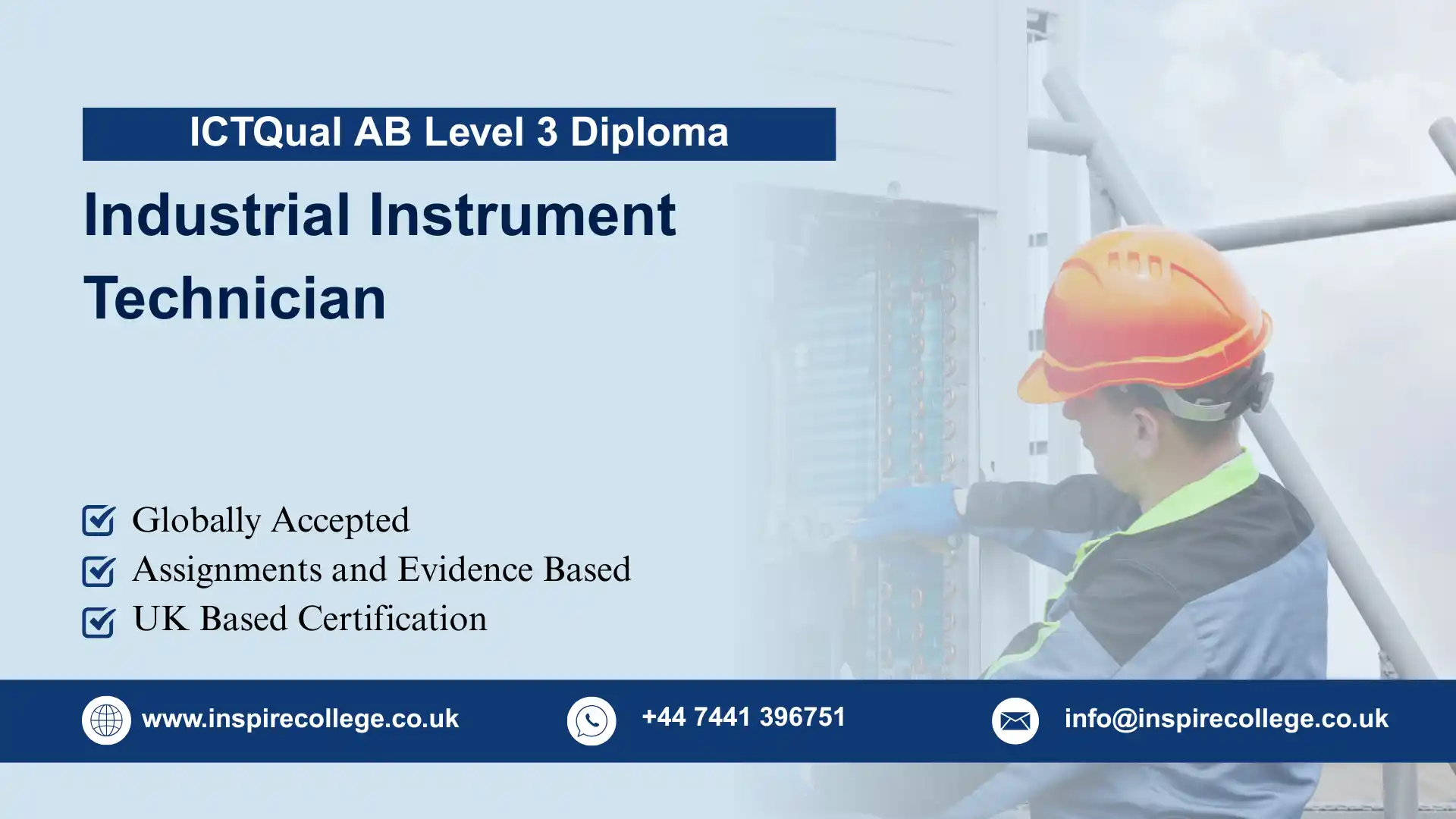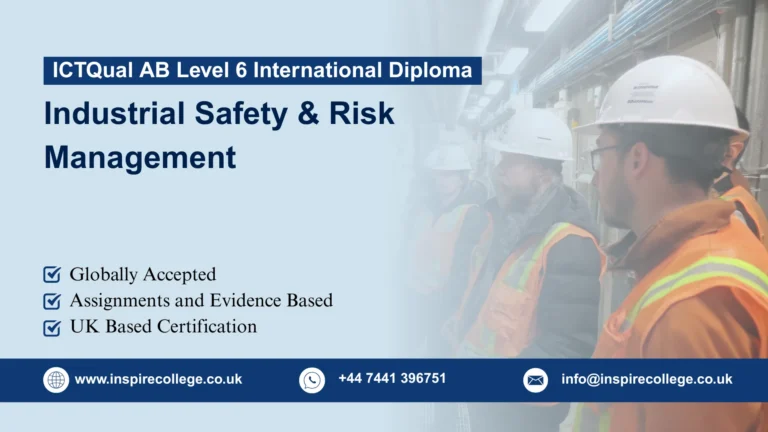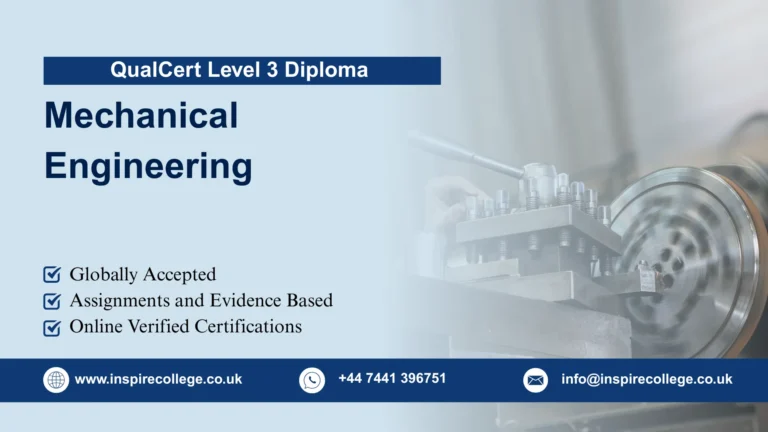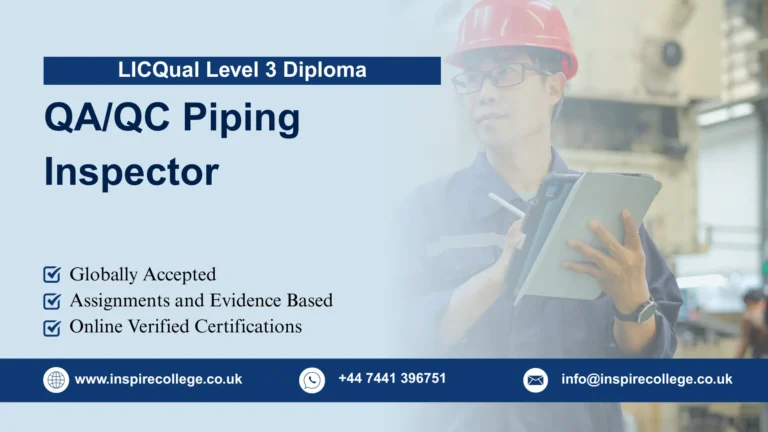
ICTQual AB Level 3 Diploma in Industrial Instrument Technician
The ICTQual AB Level 3 Diploma in Industrial Instrument Technician is a career-focused qualification designed for individuals who want to build expertise in industrial instrumentation and process control. This diploma provides a strong foundation in both theory and practice, preparing learners to work confidently as Industrial Instrument Technicians across a wide range of industries.
Instrumentation is at the heart of modern industry. From oil and gas plants to power generation, manufacturing, and chemical processing, skilled technicians are essential for ensuring that systems run safely, efficiently, and accurately. Through this Industrial Instrument Technician Level 3 Diploma, learners gain hands-on training in the installation, calibration, and maintenance of instruments such as sensors, transmitters, and controllers. The program also emphasizes troubleshooting, diagnostics, and compliance with international safety standards—skills that employers consistently demand.
What sets the ICTQual AB Industrial Instrument Technician Diploma apart is its balance of practical training and globally recognized certification. Learners not only understand how instruments function but also develop the ability to apply this knowledge in real-world industrial environments. Whether you are starting your career, upgrading your qualifications, or seeking international opportunities, this Level 3 Diploma in Industrial Instrumentation and Control provides a clear pathway to professional growth.
By completing this ICTQual AB vocational diploma in instrumentation, you position yourself as an industry-ready professional with the technical competence to support critical operations. With the demand for skilled technicians rising worldwide, this diploma opens doors to rewarding roles, long-term career stability, and advancement in the field of industrial instrumentation and control.
To enroll in the ICTQual AB Level 3 Diploma in Industrial Instrument Technician, learners are expected to meet the following entry requirements. These criteria ensure that participants are well-prepared to succeed in this industrial instrumentation and control diploma and gain the maximum benefit from the training:
Age Requirements
- Applicants should generally be 16 years or older at the time of enrollment.
- This ensures readiness for vocational training and compliance with industry safety standards
Educational Requirements
- A secondary school qualification (or equivalent) is recommended.
- A background in science, mathematics, or technical subjects is advantageous.
- Candidates without formal qualifications may still be considered if they demonstrate strong technical aptitude or prior vocational training.
Professional Experience
- No prior work experience is strictly required.
- However, learners with exposure to industrial environments, electrical systems, or mechanical maintenance will find the course especially beneficial.
- Many employers also use this Industrial Instrument Technician Level 3 Diploma to upskill existing staff.
English Language Proficiency
- Since the program is delivered in English, learners should have at least a basic to intermediate level of English proficiency.
- The ability to read technical manuals, follow safety instructions, and communicate effectively in English is essential for success in this ICTQual AB Industrial Instrument Technician Diploma..
Meeting these entry requirements ensures that learners are fully prepared to gain the maximum benefit from this vocational diploma in instrumentation and progress confidently into roles as Industrial Instrument Technicians in industries such as oil and gas, power generation, manufacturing, and process automation.
Mandatory Units
This qualification, the Level 3 Diploma in Industrial Instrument Technician, consists of 6 mandatory units.
- Fundamentals of Industrial Instrumentation
- Process Variables: Pressure, Temperature, Flow, and Level
- Instrument Calibration and Testing Techniques
- Industrial Sensors, Transducers, and Control Valves
- Programmable Logic Controllers (PLCs) and Process Automation
- Maintenance, Troubleshooting, and Industrial Safety
Learning Outcomes for the Level 3 Diploma in Industrial Instrument Technician:
Fundamentals of Industrial Instrumentation
- Understand the scope and importance of instrumentation in industrial operations.
- Explain the principles of measurement systems, accuracy, precision, and error analysis.
- Identify different types of instruments and their applications across industries.
- Apply basic electrical and electronic concepts relevant to instrumentation.
- Recognise international standards, codes, and practices in instrumentation.
- Demonstrate awareness of how instrumentation supports automation and efficiency.
- Build a foundation for advanced study in process control and automation.
- Develop the ability to link theoretical knowledge with practical applications.
Process Variables: Pressure, Temperature, Flow, and Level
- Define and explain the four key process variables and their industrial significance.
- Describe the principles and methods used to measure each process variable.
- Compare different devices and technologies used for measurement.
- Analyse how process variables affect safety, quality, and efficiency.
- Select appropriate instruments for specific process requirements.
- Interpret measurement data to support operational decision-making.
- Understand calibration requirements for process variable instruments.
- Relate process variable control to system optimisation and energy efficiency.
Instrument Calibration and Testing Techniques
- Explain the purpose and importance of calibration in industrial settings.
- Identify international standards and procedures for calibration and testing.
- Perform calibration of common industrial instruments using correct methods.
- Use calibration tools and equipment safely and effectively.
- Record, interpret, and evaluate calibration results for compliance.
- Troubleshoot errors and deviations identified during calibration.
- Understand preventive maintenance practices to reduce calibration failures.
- Develop competence in documenting calibration and test reports.
Industrial Sensors, Transducers, and Control Valves
- Differentiate between sensors, transducers, and actuators in instrumentation.
- Explain the working principles of common industrial sensors and transducers.
- Select suitable sensors for specific process applications.
- Understand the design, function, and operation of control valves.
- Analyse the role of control valves in regulating process variables.
- Apply knowledge of valve characteristics, sizing, and selection.
- Identify common faults in sensors and valves and propose corrective actions.
- Integrate sensors and control valves into automated control systems.
Programmable Logic Controllers (PLCs) and Process Automation
- Understand the architecture and components of PLC systems.
- Explain the role of PLCs in industrial automation and process control.
- Develop basic PLC programming skills using ladder logic or equivalent languages.
- Configure input and output devices for PLC-based systems.
- Apply PLCs to monitor and control industrial processes.
- Integrate PLCs with sensors, actuators, and communication networks.
- Troubleshoot common PLC hardware and software issues.
- Appreciate the role of PLCs in Industry 4.0 and smart manufacturing.
Maintenance, Troubleshooting, and Industrial Safety
- Understand the principles of preventive, predictive, and corrective maintenance.
- Apply systematic troubleshooting techniques to diagnose faults.
- Use diagnostic tools and test equipment effectively in maintenance tasks.
- Recognise the importance of safety standards and regulations in instrumentation.
- Implement safe working practices when handling instruments and systems.
- Identify potential hazards in industrial environments and propose mitigation strategies.
- Document maintenance and troubleshooting activities in line with industry standards.
- Develop a professional attitude towards reliability, safety, and continuous improvement.
The ICTQual AB Level 3 Diploma in Industrial Instrument Technician is designed for learners who want to build a strong career in industrial instrumentation and process control. Whether you are an aspiring technician, a working professional aiming to upgrade your skills, or an employer looking to upskill your team, this diploma provides the practical training and recognized certification needed to succeed. It is ideal for individuals from diverse educational and professional backgrounds who want to become industry-ready Industrial Instrument Technicians.
1. Aspiring Industrial Instrument Technicians
- Individuals who want to start a career in industrial instrumentation and process control.
- Learners seeking a recognized ICTQual AB Level 3 Diploma in Industrial Instrument Technician.
- Students interested in working with sensors, transmitters, and controllers.
- Those looking for a practical, hands-on training diploma.
- People motivated to enter industries such as oil and gas, power generation, and manufacturing.
2. Working Professionals Seeking Career Advancement
- Current technicians aiming to upgrade their qualifications.
- Employees who want to move into senior instrumentation roles.
- Professionals looking to strengthen their instrument calibration and maintenance skills.
- Workers seeking a globally recognized diploma to boost employability.
- Those preparing for international job opportunities in industrial instrumentation.
3. Engineering and Technical Graduates
- Graduates in engineering, electronics, or mechanical fields.
- Students who want to add a vocational diploma in instrumentation to their profile.
- Learners seeking practical skills beyond academic theory.
- Those preparing for industrial automation and process control careers.
- Graduates aiming to stand out in competitive technical job markets.
4. Industry-Specific Workforce (Oil, Gas, Power, Manufacturing)
- Employees in oil and gas plants who need instrumentation expertise.
- Workers in power generation and energy sectors.
- Technicians in manufacturing and chemical processing industries.
- Staff responsible for industrial safety, compliance, and efficiency.
- Teams needing instrumentation training for operational excellence.
5. Career Changers and International Learners
- Individuals seeking a globally recognized ICTQual AB diploma.
- Career changers moving into industrial instrumentation technician jobs.
- Learners from non-technical backgrounds with strong interest in process control.
- Professionals relocating to regions where instrumentation skills are in demand.
- Students aiming for international career opportunities in technical fields.
6. Employers and Training Managers
- Companies looking to upskill their workforce in instrumentation.
- HR managers seeking standardized training programs for technicians.
- Employers who want staff certified with the ICTQual AB Level 3 Diploma.
- Organizations aiming to improve instrument calibration and diagnostics.
- Training providers offering industry-ready instrumentation courses.
7. Students Seeking Long-Term Career Stability
- Learners who want a future-proof career in industrial instrumentation.
- Individuals motivated by job security and global demand for technicians.
- Students aiming for higher-paying technical roles.
- Those who want to build a foundation for advanced studies in instrumentation or engineering.
- Learners seeking a clear pathway to career growth and stability.
Register Now
FAQs for ICTQual AB Level 3 Diploma in Industrial Instrument Technician






